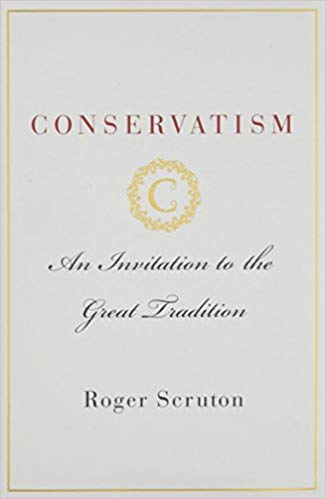You have /5 articles left.
Sign up for a free account or log in.
 Conservatism: An Invitation to the Great Tradition by Roger Scruton
Conservatism: An Invitation to the Great Tradition by Roger Scruton
Published in June of 2018.
“….I have written this book in the hope of encouraging well-meaning liberals to take a look at what those arguments really are.” (Page 6).
In my world, you can’t swing an iPad without smacking more than a few of us well-meaning liberals in the face.
The learning side of the higher ed technology house leans left. Our colleagues from the administrative computing wing are, in my experience, more ideologically varied.
The reason that I read Conservatism: An Invitation to the Great Tradition is that I’ve been looking for an introduction to the great tradition of conservatism. My professional and social circles are embarrassingly non-diverse when it comes to political leanings. The range of most people I know goes from moderate (me) to progressive.
I do not doubt that I have colleagues in the educational developer/learning innovation communities who self-identify as conservatives and vote Republican under most circumstances. I just don’t know who these colleagues are.
So under the theory that if we all agree that we all must be wrong, I read Conservatism.
The book is helpful in providing some measure of intellectual historical grounding in conservative ideas. I was enlightened to understand the roots of conservative thinking as responses to the Enlightenment, the French Revolution, and the intellectual opposition to socialism. In its insistence on individual rights and respect for family, conservative thinking is not all that far away from the values espoused by liberals.
Where Conservatism was less helpful is in connecting conservative ideals with political choices. Conservative ideals have historically been associated with such policies as free trade, a principled foreign policy, and a commitment to civil discourse. It is difficult to see how the behavior, actions, and policies of the current administration fit any definition of conservatism.
Scruton chooses to mostly ignore the gap between conservative thinking and the actions of the politicians who fly under the conservative banner. This unwillingness to descend from the beauty of ideas to the messy realities of politics makes the case for conservatism less convincing.
Perhaps what is needed, or at least what I need, is an argument for conservatism told purely through a higher ed lens.
We higher ed people are, I suspect, more conservative in our local actions and beliefs than we realize. Even those of us who wish to evolve the higher ed ecosystem to something that is more open and beneficial to everyone in our society would likely defend many of our traditions, structures, and values. We believe in change, but there is much that we would like to conserve.
Should all my centrist, liberal, and progressive friends and colleagues read Conservatism? Should you?
Conservatism is short. It is well-written. While there are some aspects of the book that very much turned me off (I am a moderate-to-liberal after all), I respect the author’s breadth of knowledge and flashes of intellectual modesty.
Despite these aspects in the book's favor, Conservatism was not written as an argument for liberals to re-examine their core beliefs. Instead, the book reads more like an effort to provide an intellectual grounding to those who already self-identify on the right. If you are already a self-identified conservative, then Conservatism may help you locate the history of your beliefs. If you are not a conservative - like (unfortunately) almost everyone that I know - then you will not likely be persuaded to alter your thinking.
I’ll admit to feeling somewhat bored with my political leanings, and hugely curious about the thinking of those who do not share my ideas. I’m wondering if I really do wish that my learning networks were more ideologically diverse.
Reading and talking about Conservatism may be one way into this conversation and a larger community of ideas. What I’d like is a book that attempted an even-handed balance between intellectual history and politics, ideas and policies.
Do you know of a book by a moderate-conservative that tries to make sense of the future of higher ed from a starting place of ideas?
What are you reading?




